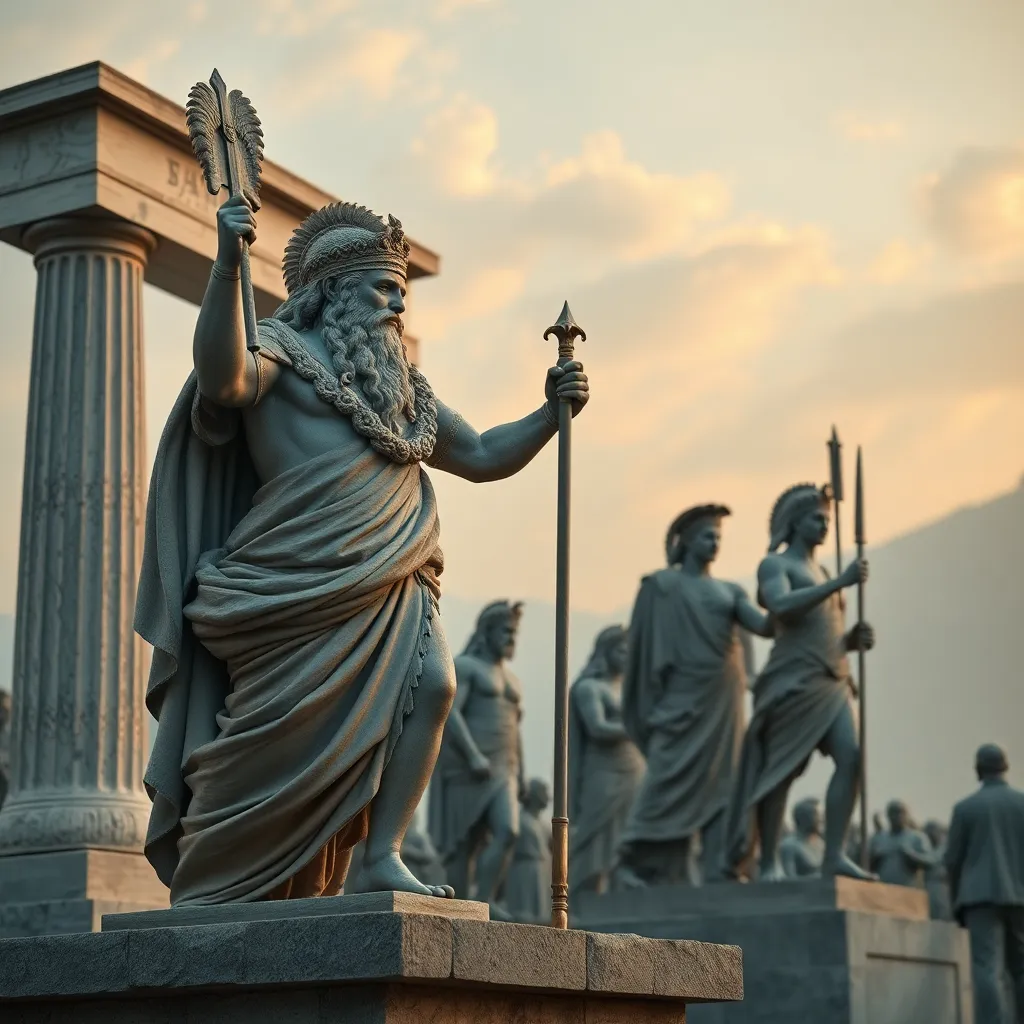The Cultural Significance of Theseus in Ancient Greek Festivals
I. Introduction
Theseus, one of the most celebrated heroes of ancient Greek mythology, represents the ideal qualities of courage, intelligence, and strength. His adventures and trials resonate deeply within the fabric of Greek culture. Festivals in ancient Greece held immense importance, serving as occasions for worship, community bonding, and cultural expression. This article aims to explore the cultural significance of Theseus in ancient Greek festivals, highlighting his enduring legacy and influence on Athenian society.
II. The Myth of Theseus
Theseus’s mythological narrative is rich with key stories and adventures that have captivated audiences for centuries. Some of his most notable exploits include:
- Defeating the Minotaur in the labyrinth of Crete.
- His journey to Athens, where he sought to unite the city-states.
- His role in various mythological events, such as the Argonauts’ quest for the Golden Fleece.
Symbolically, Theseus embodies the qualities of a true hero, representing the struggle against chaos and the pursuit of civilization. He is often associated with the city of Athens, which adopted him as a founding figure, further solidifying his importance in Athenian identity.
III. Major Festivals Celebrating Theseus
Two of the most significant festivals celebrating Theseus were the Panathenaea and the Eleusinian Mysteries.
A. The Panathenaea
The Panathenaea was one of the most important festivals in ancient Athens, held annually in honor of the goddess Athena. Its significance lay in its role as a unifying event for the citizens of Athens, showcasing their artistic and athletic prowess.
- Description and significance: The festival included various competitions, such as athletic games, musical contests, and a grand procession to the Acropolis.
- Theseus’s role in the festival: Theseus was often depicted as a protector of the city, and his deeds were celebrated during the festivities. His mythological narrative served as a reminder of Athenian values and communal identity.
B. The Eleusinian Mysteries
The Eleusinian Mysteries were another pivotal aspect of ancient Greek religious life, centered around the myth of Demeter and Persephone. These rites were shrouded in secrecy and were believed to offer initiates profound insights into life and death.
- Overview of the mysteries: The mysteries involved a series of rituals that celebrated the agricultural cycle and the promise of rebirth.
- Theseus’s influence on the rituals and beliefs: While Theseus was not the primary figure in the Eleusinian Mysteries, his heroism and moral integrity were often invoked to symbolize the triumph of life over death, reflecting the themes central to these rites.
IV. Theseus as a Cultural Hero
Theseus’s representation as a cultural hero is deeply intertwined with Athenian values and ideals. He exemplifies the virtues of bravery, wisdom, and civic duty, which were paramount in Athenian society.
- Representation of Athenian values and ideals: Theseus’s adventures often highlight qualities such as justice, leadership, and the importance of community.
- Role in the unification of Attica: Theseus is credited with the political unification of Attica, transforming it into a cohesive entity under Athenian rule.
- Impact on civic identity and pride: His legacy instilled a sense of pride in Athenian citizens, reinforcing their cultural identity through shared myths and traditions.
V. Artistic Representations of Theseus in Festivals
The cultural impact of Theseus extended beyond mythology into the realms of art and literature, particularly during festivals.
- Sculpture and architecture inspired by Theseus: Numerous sculptures and temples were erected in his honor, showcasing his valor and adventures.
- Literature and drama featuring Theseus: Theseus has been a central figure in various works of literature and drama, including plays by Euripides and Sophocles, reflecting his heroic status.
- The role of Theseus in theatrical performances during festivals: His stories were often dramatized during festivals, engaging audiences and reinforcing his role as a cultural icon.
VI. Rituals and Ceremonies Involving Theseus
Various rituals and ceremonies dedicated to Theseus were integral to ancient Greek festivals, fostering community cohesion.
- Specific rituals dedicated to Theseus: These included sacrifices and offerings made in his name, particularly during the Panathenaea.
- The significance of these ceremonies in community bonding: Such rituals served to strengthen the social fabric of Athenian society, fostering a shared sense of identity and purpose.
- Continuity and change in these practices over time: While the core elements of these rituals remained, adaptations occurred as society evolved, reflecting changing beliefs and values.
VII. Modern Interpretations and Legacy
Theseus’s influence extends into contemporary culture, illustrating his timeless appeal and relevance.
- Influence of Theseus in contemporary culture: Theseus’s stories continue to inspire modern literature, films, and art, resonating with themes of heroism and adventure.
- Relevance of Theseus in modern festivals and celebrations: Some modern festivals still echo the traditions of ancient Greece, celebrating the hero in various forms.
- The enduring legacy of Theseus in Western literature and arts: His character has become a archetype of the hero’s journey, influencing countless narratives and artistic expressions throughout history.
VIII. Conclusion
Theseus’s cultural significance in ancient Greek festivals highlights his role as a symbol of Athenian identity and values. Through his myths and the celebrations dedicated to him, Theseus represents the ideals of heroism, community, and cultural pride that defined ancient Greek society. Preserving these ancient traditions not only honors the past but also enriches our understanding of contemporary culture. As we reflect on the relevance of Theseus today, we recognize the enduring power of myths to inspire and unite communities across generations.




